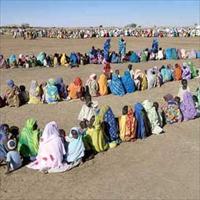SOMALIA: Two million face humanitarian crisis, warn agencies

An estimated two million people in Somalia are facing a humanitarian crisis and need urgent aid, humanitarian agencies have warned.
In a statement, the UN Food and Agriculture Organization's (FAO) Food Security Analysis Unit (FSAU) and FEWS NET Somalia, said the humanitarian situation in southern and central regions of the country had deteriorated in the past six months.
"Between 1.8 million and two million people, including roughly one million IDPs [internally displaced people], are estimated to be in need of humanitarian assistance and livelihood support for at least the next six months," the agencies stated.
The worst-affected regions are Lower and Middle Shabelle, Hiiraan and Central regions, due largely to "a significant increase in the number of internally displaced persons fleeing Mogadishu [the capital] and a deepening drought in Hiiraan and Central regions".
Moreover, “hyperinflation across the country was creating problems of food access for urban populations, especially the urban poor".
Cindy Holleman, FAO's chief technical adviser to FSAU-Somalia, said: "The Shabelle regions remain the worst affected in the current humanitarian crisis, with more than 325,000 agriculturalists and agro-pastoralists in states of humanitarian emergency or acute food and livelihood crisis."
Holleman said these regions were, at the same time, hosting at least 367,000 new IDPs from Mogadishu.
An 2007-08 Deyr (October-December) assessment found that an estimated 850,000 of those in need live in rural areas "and face conditions of humanitarian emergency or acute food and livelihood crisis", while the rest were IDPs, 700,000 of whom were newly displaced from Mogadishu in the ongoing violence between insurgents and Ethiopian-backed government forces.
Most of the displaced were in regions that were already facing "the worst problems in terms of food access, collapsing livelihoods, and emergency nutrition levels (Lower and Middle Shabelle, Hiiraan and Central regions)," the agencies said.
Matthew Olins, deputy head of office for the UN Office for Coordination of Humanitarian Affairs in Somalia (OCHA-Somalia), told IRIN on 5 February that as long as there was no improvement in the security situation, the humanitarian outlook would continue to be bleak.
"The continued outflow of IDPs from Mogadishu and poor Deyr rains in parts of south and Central regions are contributing to the crisis," Olins said.
"The recent tragic attack on humanitarian aid workers compounds the crisis and has affected the ability of agencies to continue life-saving humanitarian operations," Olins added.
In the latest incident targeting aid workers, three employees of Médecins Sans Frontières (MSF-Holland) were killed in the southern coastal city of Kismayo. As a result, 87 international staff in 14 projects across the country have been withdrawn, according to the agency.
 Back and Next - Back and Next
Back and Next - Back and Next See Also - See Also
See Also - See Also